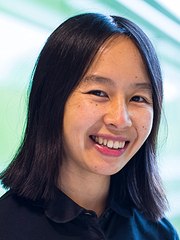Lectures
Below you will find detailed information about the lectures and the lecturers.
25 Jan - Susan Herring (Indiana University Bloomington)
Performing conversation: Interactional strategies in TikTok duets

Susan Herring is Professor of Information Science and Linguistics at Indiana University Bloomington and Director of the Center for Computer-Mediated Communication, which she founded. One of the first scholars to conduct linguistic analysis of textual computer-mediated communication, in recent years she has focused on multimodal CMC. She is broadly interested in understanding and describing the nature of technologically mediated discourse, its effects on self-expression, interpersonal interaction, and its social impacts. She has published nearly 200 works, including 11 edited collections, mostly on CMC. A past editor of the Journal of Computer-Mediated Communication, she currently edits the journal Language@Internet.
Abstract
Humans feel impelled to converse with other humans over technological systems, even when the technology in question does not support conversation well. How do people overcome physical, technical, and logistical challenges and route around obstacles posed by interfaces and systems that are unwelcoming/unfriendly to conversation? What (new) kinds of conversation emerge through this process? I explore these questions through TikTok’s duet feature, a platform affordance that allows users to respond to a previously recorded video, generating a new video in which the original video and the response video are displayed side by side. Dueters do not engage in real time or reciprocally with the video they duet; rather they record themselves over a pre-existing video. This makes conversational interaction seemingly a logical impossibility. Yet some TikTok duets are virtually indistinguishable from synchronous back-and-forth conversational exchanges. To examine how this illusion is achieved and what dueters gain from producing it, I analyze two samples totalling 700 conversational TikTok duets using systematic conversation analysis (White, 2019), focusing on the mechanics of turn-taking. Findings reveal that users obey the conversational imperative by creatively exploiting TikTok’s duet feature to perform conversational interaction. At the same time, dueters must balance conflicting pressures to be original, on one hand, and on the other hand, to gain visibility by catering to TikTok’s distribution algorithm (Herman, 2023).
22 Feb - Jannis Androutsopoulos (Universität Hamburg)
Graphic cues and heterographic practices in digital discourse

Jannis Androutsopoulos is professor in German and media linguistics at the University of Hamburg. From 2016-2023 he was also a research professor at MultiLing, University of Oslo. His research explores relationships between language, media and society, covering themes such as the dynamics of multilingualism in digital spaces, the role of media in sociolinguistic change, spelling and script in a digital age, and language ideologies in media discourse. Recent publications include Handbuch Sprache und digitale Kommunikation (2024, co-edited with Friedmann Vogel, currently in press); Multilingual families in a digital age: mediational repertoires and transnational practices (2023, co-authored with Kristin Vold Lexander); and Polymedia in interaction (2021, guest-edited Special Issue of Pragmatics and Society, 12:5).
Jannis is currently coordinating DiLCo, the research network on ‘Digital language variation in context’, and a research project on semiotic landscapes and social inequality in secondary schools.
Abstract
The spread of text-based mediated interaction during the 2010s has led to a proliferation of graphic contextualization cues for the coordination of mediated interaction and expression of stance. While the discourse functions of emoji are amply documented, non-referential features of written language (punctuation, spelling and typography) are only sporadically addressed (‘typographic tone of voice’, McCulloch 2019; ‘CMC cues’, Darics 2020; ‘prosodic orthography’, Heath 2021; ‘interactional punctuation’, Busch 2021). The research reported in this lecture draws on data from social media platforms to examine two features that index double-voicing in public digital discourse: (a) the ‘indignation mark’, a twist on the iterated exclamation mark that involves digits or numerals, e.g. <!!!1!>; (b) ‘alternating caps’, the alternation of upper and lower case characters within a word or phrase, e.g. ‘cLIMAtE chANge Is a hOAX’. The fact that these features occur in environments of otherwise orthographic writing, often as part of elaborate comments, weakens their normative interpretation as ‘deviations’ from a written standard; it invites instead an explanation that emphasizes the strategic manipulation of visual language in tandem with the construal of social positionalities in discourse. Based on data from German and Greek Reddit forums, this lecture uses the terms ‘graphic cues’ and ‘heterographic practice’ to examine the pragmatic and ideological work accomplished by graphic resources, with alternating caps as a case in point.
28 Mar - Sandra Kübler (Indiana University Bloomington)
Hate speech detection: Bias in data and annotations

Sandra Kübler is a Professor of Computational Linguistics in the Department of Linguistics at Indiana University. Her main research areas are syntactic parsing, with a focus on morphologically rich languages, and machine learning approaches to sentiment analysis, emotion detection, hate speech detection, and conspiracy detection, with a focus on decisions made during data collection and annotation. Dr. Kübler currently serves as an associate editor for the journal Natural Language Engineering.
Abstract
Hate speech detection is popular topic with important real world applications. In this talk, I want to have a closer look at the data situation in hate speech detection. Using machine learning for hate speech detection tends to give good results, but such results are often deceptive. Issues that that have been raised are biases in the data, annotation quality, sampling strategies, domain effects, but also include the definition of what we consider hate speech. All of these issues have a profound effect on results, but do not have simple solutions.
25 Apr - Christoph Purschke (University of Luxembourg)
Figures in discourse. Monitoring the public debate on multilingualism in Luxembourg
 Christoph Purschke is an associate professor of computational linguistics and the head of the Culture & Computation Lab in the Department of Humanities at the University of Luxembourg. His research interests lie at the intersection of sociolinguistic methods, natural language processing, and philosophy. He runs the participatory research platform „Lingscape“ and is fascinated by the complex relationship between language, digitality, and the lifeworld.
Christoph Purschke is an associate professor of computational linguistics and the head of the Culture & Computation Lab in the Department of Humanities at the University of Luxembourg. His research interests lie at the intersection of sociolinguistic methods, natural language processing, and philosophy. He runs the participatory research platform „Lingscape“ and is fascinated by the complex relationship between language, digitality, and the lifeworld.
Abstract
In this talk, I will examine the Luxembourgish public debate on multilingualism and the societal role of Luxembourgish. The focus is on so-called discourse figures, i.e., central images, formulations, and actors of the discourse, and their structure-forming effect in the debate. To this end, I introduce a multi-method approach that combines qualitative, quantitative, and computational approaches. In doing so, the study draws a more comprehensive picture than possible with just one research method. The talk aims to identify central discourse figures in the various datasets and combine them into an overall picture against the background of societal dynamics.
23 May - Dong Nguyen (Utrecht University)
 Social Perceptions of Language Variation: Comparing Humans and LLMs
Social Perceptions of Language Variation: Comparing Humans and LLMs
When NLP meets social meaning
Dong Nguyen is an assistant professor at the Department of Information and Computing Sciences at Utrecht University. At Utrecht University, she is heading the Natural Language Processing (NLP) and Society Lab. She is interested in the intersection between NLP and sociolinguistics, exploring how NLP can be used to support sociolinguistic research and how sociolinguistics can inform the development of better NLP models.
Abstract
There are often various ways to express the same thing. Think of, for example, the different words we can use for a given concept, or the many creative spellings in social media. Language variation is often seen as a challenge for developing robust NLP models. However, language variation is also an opportunity: it can help us develop models that are more sensitive to social context. In this talk, I will present current research into the associations that Large Language Models form regarding spelling variations and how these associations align with human perceptions.
20 Jun - Alexandra Georgakopoulou (King’s College London)
Memes, selfies, Stories, short form videos…: Technographic reflections on the age of small story formats
 Alex Georgakopoulou is Professor of Discourse Analysis & Sociolinguistics & Co-Director of the Centre for Language, Discourse & Communication, King’s College London. She has developed small stories research, a paradigm for the analysis of everyday life storytelling and identities, with a current focus on social media. Recent publications include: ‘Quantified storytelling: A narrative analysis of metrics on social media’ (with Stefan Iversen & Carsten Stage, 2020, Palgrave) & ‘Small stories research: Tales, tellings and tellers across contexts’ (2023, co-ed. with Korina Giaxoglou & Sylvie Patron, Routledge). Her co-authored (with Anna De Fina) book Analyzing narratives online is forthcoming with Routledge. She is the Co-Editor of the Routledge Research in Narrative, Interaction & Discourse Series.
Alex Georgakopoulou is Professor of Discourse Analysis & Sociolinguistics & Co-Director of the Centre for Language, Discourse & Communication, King’s College London. She has developed small stories research, a paradigm for the analysis of everyday life storytelling and identities, with a current focus on social media. Recent publications include: ‘Quantified storytelling: A narrative analysis of metrics on social media’ (with Stefan Iversen & Carsten Stage, 2020, Palgrave) & ‘Small stories research: Tales, tellings and tellers across contexts’ (2023, co-ed. with Korina Giaxoglou & Sylvie Patron, Routledge). Her co-authored (with Anna De Fina) book Analyzing narratives online is forthcoming with Routledge. She is the Co-Editor of the Routledge Research in Narrative, Interaction & Discourse Series.
Abstract
Stories on social media platforms, more than any other communication mode, have increasingly become designed, curated features, with a bundling of pre-selections and templates. Connected with this, is an unprecedented -in speed- development of normative, typified small stories on different platforms, where the requirement for sharedness amongst users who may partake in transient acts of communication, is superseded by the recognizability of what may be typical. In this lecture, I set out to show how we can study this typification of stories online, with what kinds of reimaginings of methods and analysis from contextual research on communication. I specifically draw on the ethnomethodological concept of formatting, as reworked by the late Jan Blommaert (2020) for the study of online communication, and I synergize it with a technographic method and a multi-modal small stories & positioning micro-analysis of platformed stories. Drawing on a real-time tracking of stories as socio-technical engineered features on all major Western platforms, I present the key-features of sharing-life-in-the-moment, as the over-arching formatted practice of storytelling online, its links with authenticity, and its latest reconfigurations on TikTok short form videos. In doing so, I hope to show what a practice-based approach to (narrative) communication in the (post)digital, GenAI-infiltrated era should look like.
4 Jul - Heike Zinsmeister (Universität Hamburg)
Hate speech without slurs: Cues in contextualized texts
 Heike Zinsmeister is a professor of German and corpus linguistics at Universität Hamburg. Her research focuses on the creation, annotation, and computational analysis of text corpora for research in Linguistics and Digital Humanities, as well as on ways to make corpus resources and methods accessible to ‘non-computational‘ users. Together with Sandra Kübler (see talk on 28 March 2024) she wrote Corpus Linguistics and Linguistically Annotated Corpora. More recently, she has been exploring the power and limitations of generative AI in (computational) linguistic tasks such as hate speech detection. Heike is currently coordinating DiLCo, the research network on ‘Digital language variation in context’, together with Jannis Androutsopoulos, and KoDi-FS, an institutional partnership for German language, literature and culture (GIP worldwide) together with Vilnius University in Lithuania. She also serves as PI of IdeaLite, a research project on modeling simplified German in cooperation with Saarland University. Furthermore, she is co-coordinating the DH Labat Universität Hamburg.
Heike Zinsmeister is a professor of German and corpus linguistics at Universität Hamburg. Her research focuses on the creation, annotation, and computational analysis of text corpora for research in Linguistics and Digital Humanities, as well as on ways to make corpus resources and methods accessible to ‘non-computational‘ users. Together with Sandra Kübler (see talk on 28 March 2024) she wrote Corpus Linguistics and Linguistically Annotated Corpora. More recently, she has been exploring the power and limitations of generative AI in (computational) linguistic tasks such as hate speech detection. Heike is currently coordinating DiLCo, the research network on ‘Digital language variation in context’, together with Jannis Androutsopoulos, and KoDi-FS, an institutional partnership for German language, literature and culture (GIP worldwide) together with Vilnius University in Lithuania. She also serves as PI of IdeaLite, a research project on modeling simplified German in cooperation with Saarland University. Furthermore, she is co-coordinating the DH Labat Universität Hamburg.
Abstract
The pervasive problem of hate speech extends beyond the use of overt slurs and explicit derogatory language. Implicit hate speech in social media is not a homogeneous class; rather, it encompasses a range of different phenomena (Wiegand et al. 2021, ElSherief et al. 2021). In this talk, I will present the complexity of implicit hate speech as linguistic variation in online data by examining its linguistic and pragmatic dimensions. These include questions, conditionals, sarcasm, metaphor, and coded language, which become hateful through presuppositions and pragmatic inferences. I will discuss different manifestations and challenges for detecting them automatically, including a pilot study on the use of generative AI.
